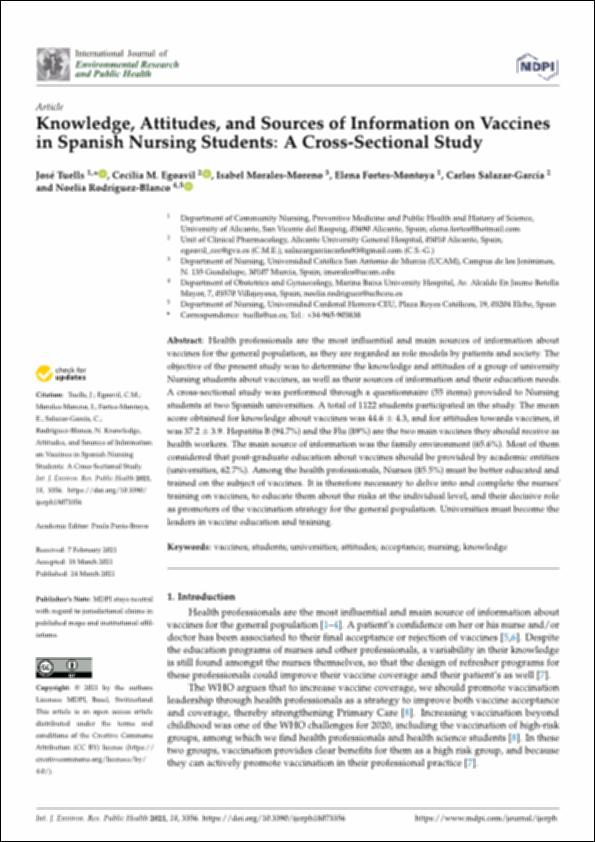Please use this identifier to cite or link to this item:
http://hdl.handle.net/10637/12895Knowledge, attitudes, and sources of information on vaccines in Spanish nursing students : a cross-sectional study
| Title: | Knowledge, attitudes, and sources of information on vaccines in Spanish nursing students : a cross-sectional study |
| Authors : | Tuells Hernández, José Vicente Egoavil Rojas, Cecilia Magdalena Morales Moreno, Isabel Fortes Montoya, Elena Salazar García, Carlos Rodríguez Blanco, Noelia |
| Keywords: | Estudiantes de enfermería.; Nursing students.; Vaccines.; Vacunas. |
| Publisher: | MDPI |
| Citation: | Tuells, J., Egoavil, C.M., Morales-Moreno, I., Fortes-Montoya, E., Salazar-García, C., Rodríguez-Blanco, N. (2021). Knowledge, attitudes, and sources of information on vaccines in Spanish nursing students: a cross-sectional study. International Journal of Environmental Research and Public Health, vol. 18, i. 7 (24 mar.), art. 3356. DOI: https://doi.org/10.3390/ijerph18073356 |
| Abstract: | Health professionals are the most influential and main sources of information about vaccines for the general population, as they are regarded as role models by patients and society. The objective of the present study was to determine the knowledge and attitudes of a group of university Nursing students about vaccines, as well as their sources of information and their education needs. A cross-sectional study was performed through a questionnaire (55 items) provided to Nursing students at two Spanish universities. A total of 1122 students participated in the study. The mean score obtained for knowledge about vaccines was 44.6 4.3, and for attitudes towards vaccines, it was 37.2 3.9. Hepatitis B (94.7%) and the Flu (89%) are the two main vaccines they should receive as health workers. The main source of information was the family environment (65.6%). Most of them considered that post-graduate education about vaccines should be provided by academic entities (universities, 62.7%). Among the health professionals, Nurses (85.5%) must be better educated and trained on the subject of vaccines. It is therefore necessary to delve into and complete the nurses’ training on vaccines, to educate them about the risks at the individual level, and their decisive role as promoters of the vaccination strategy for the general population. Universities must become the leaders in vaccine education and training. |
| Description: | Este artículo se encuentra disponible en la siguiente URL: https://www.mdpi.com/1660-4601/18/7/3356 Este artículo pertenece al número especial "Nursing research". |
| URI: | http://hdl.handle.net/10637/12895 |
| Rights : | http://creativecommons.org/licenses/by/4.0/deed.es |
| ISSN: | 1660-4601 (Electrónico). |
| Issue Date: | 24-Mar-2021 |
| Center : | Universidad Cardenal Herrera-CEU |
| Appears in Collections: | Dpto. Enfermería y Fisioterapia |
Items in DSpace are protected by copyright, with all rights reserved, unless otherwise indicated.


